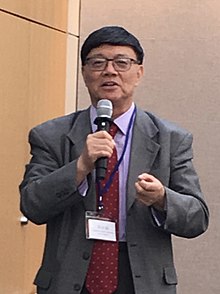Song Yongyi
 From Wikipedia the free encyclopedia
From Wikipedia the free encyclopedia
Yongyi Song | |
|---|---|
 Yongyi Song Speaking at a Conference | |
| Born | Yongyi Song December 15, 1949 Cixi, Zhejiang, China |
| Occupation | Author, political activist, lecturer |
| Education | Shanghai Normal University University of Colorado Boulder Indiana University |
Song Yongyi (Chinese: 宋永毅; born 15 December 1949)[1] is a Chinese American historian who specializes in the study of Chinese Cultural Revolution.[2][3][4][5] He currently works at the California State University, Los Angeles, and previously served as a college librarian at the Dickinson College in Pennsylvania.[6][7]
Biography[edit]
Song Yongyi was born in Shanghai, China in December 1949.[1][8] During the Cultural Revolution, Song became a Red Guard who followed Mao Zedong, but was jailed when he was 17 for several years because he was part of the "counter-revolutionary clique" that challenged Zhang Chunqiao.[2][3][8]
After the Cultural Revolution, he was accepted into the Shanghai Normal University in 1977, when the National College Entrance Examination was resumed by Deng Xiaoping.[8] He came to the United States in 1989 and obtained a Master of Arts from the University of Colorado Boulder in 1992, and was awarded another master's degree at the Indiana University Bloomington in 1995.[8][9][10]
In the summer of 1999, Song went back to China to collect documents related to the Cultural Revolution, but was arrested by the Chinese government for "stealing state secrets".[1][8][11][12] More than 100 scholars and researchers called for his release.[8][12] United States senator Arlen Specter and U.S. Representative Matt Salmon intervened in the case and negotiated with Jiang Zemin, then General Secretary of the Chinese Communist Party and Chinese President.[3][5] Song was finally released from prison after more than 100 days.[4][5][8]
Awards[edit]
- "The Eighth Cultural Award," The Chan's Journalism and Culture Foundation in New York on July 7, 2000.[13]
- "Award for Scholarship and Promoting Intellectual Freedom," The Pennsylvania Library Association, September 26, 2000.
- "The 21st Century Librarian National Award," School of Information Studies, Syracuse University, October 10, 2004.
- "Paul Howard Award for Courage," American Library Association, Chicago, June 28, 2005.[14]
- "Champion of Freedom of Speech Award," Visual Artists Guild, Los Angeles, May 27, 2006.
- "Zoia Horn Intellectual Freedom Award," California Library Association, November 11, 2011.
- "CALA Distinguished Service Award," Chinese-American Librarian Association, June 16,2013.
Selected publications[edit]
- Song, Y. (2021). Mao Zedong he Wenhua Dageming: Zhengzhi xinli yu wenhua jiyin de xinchanshi [Mao Zedong and the Cultural Revolution: A new interpretation from perspectives of political psychology and cultural gene]. Taibei: Lianjing chubanshe.
- Yongyi Song; Dajin Sun; Eugene Wu (1998). The Cultural Revolution: a bibliography, 1966-1996. Harvard-Yenching Library, Harvard University. ISBN 978-0-941128-06-3.
- Song Yongyi; Zhou Zehao. Heterodox Thoughts During the Cultural Revolution, Parts I and II, Contemporary Chinese Thought 32, no. 4 (Summer 2001); 33, no. 1 (Fall 2001)
- Jian Guo; Yongyi Song; Yuan Zhou (2006). Historical Dictionary of the Chinese Cultural Revolution. Scarecrow Press. ISBN 978-0-8108-5461-1.
- Song Yongyi (2011). CHRONOLOGY OF MASS KILLINGS DURING THE CHINESE CULTURAL REVOLUTION (1966-1976). Sciences Po.
- Guo Jian, Yongyi Song, Yuan Zhou (2015). Historical Dictionary of the Chinese Cultural Revolution (Historical Dictionaries of War, Revolution, and Civil Unrest). Rowman & Littlefield Publishers.
References[edit]
- ^ a b c Mufson, Steven (2000-01-04). "In China, Librarian Relives Revolution". Washington Post. ISSN 0190-8286. Retrieved 2021-01-09.
- ^ a b Yu, Verna (2013-02-19). "'Enemy of the people' historian Song Yongyi gives as good as he gets". South China Morning Post. Retrieved 2021-01-08.
- ^ a b c Liu, Melinda (2000-02-13). "Secrets Of The Past". Newsweek. Retrieved 2021-01-08.
- ^ a b "Chinese historian Song Yongyi to speak at Stanford Feb. 28: 2/00". Stanford University. Retrieved 2021-01-08.
- ^ a b c Shenon, Philip (2000-01-30). "Scholar Back in U.S. After China Detention (Published 2000)". The New York Times. ISSN 0362-4331. Retrieved 2021-01-08.
- ^ "Yongyi Song". Cal State LA. 2014-09-23. Retrieved 2021-01-08.
- ^ "Song, Yongyi". Dickinson College. Retrieved 2021-01-08.
- ^ a b c d e f g Luo, Siling (2018-03-14). "习近平欲为文革翻案?解读新版历史教科书争议". The New York Times (in Chinese). Retrieved 2021-01-08.
- ^ "China's Cultural Revolution Addressed By Yongyi Song April 20 At CU's Norlin Library". CU Boulder Today. 2001-04-12. Retrieved 2021-01-08.
- ^ "China vs. Song Yongyi". old.post-gazette.com. Retrieved 2021-01-08.
- ^ "Song Yongyi". NPR.org. Retrieved 2021-01-08.
- ^ a b "文革学者宋永毅获释返美". BBC (in Chinese). Retrieved 2021-01-08.
- ^ Margie Yu. "Cal State L.A. Librarian Receives 21st Century Librarian Award." Office of Communications and Public Affairs, California State University, Los Angeles, Oct. 8, 2004. http://www.calstatela.edu/univ/ppa/newsrel/libaward-ysong.html
- ^ American Library Association. "2005 Paul Howard Award For Courage recipient named," 2005-05-25. http://www.ala.org/Template.cfm?Section=News&template=/ContentManagement/ContentDisplay.cfm&ContentID=95110